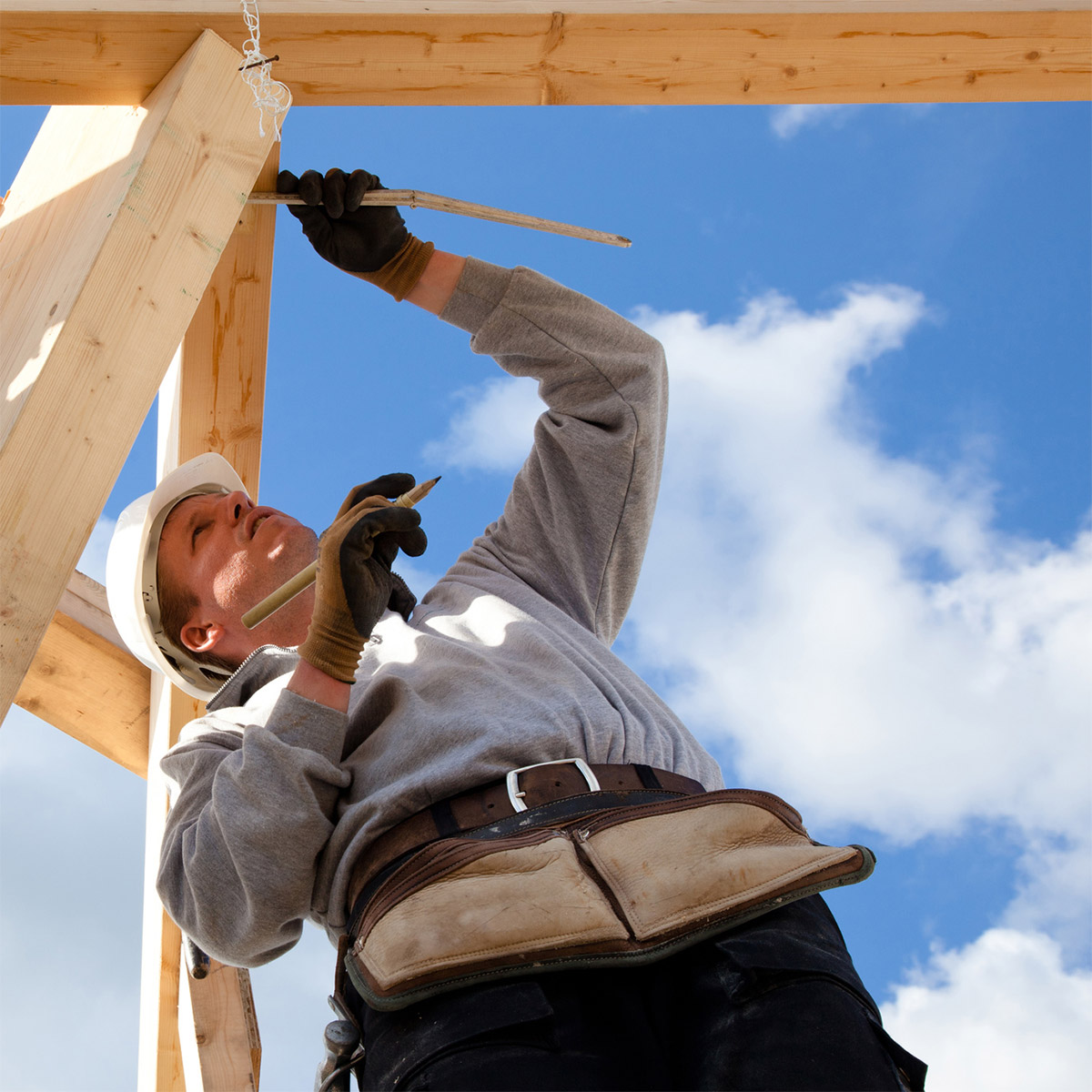
Becoming A Registered Builder In Australia

Navigating The World Of Construction: Becoming A Registered Builder In Australia
Builders are responsible for constructing, renovating, and repairing buildings in structures. Whether it be homes, commercial buildings, and public infrastructures, builders are involved in all aspects of the construction process.
Overall, builders play a critical role in the construction industry in Australia, overseeing and managing the building of everything from homes and commercial buildings to infrastructure projects like bridges and highways.
In this article, we'll run you through what exactly a builder's work is, how to become one, and what good qualities you should possess to become a successful builder. Let's dive right in!
Update: 2025: In a report by the federal government research and advisory body, it takes nearly twice as long to build a new home in Australia as it did 10 years ago. There is a target to build 1.2 mil homes in 5 years. (This is already 25% behind)
Danielle Wood Productivity Commission Chair:
- houses 6 months 10 years ago to 10 months today
- town houses are taking 3 months longer to build
- high-rise taking 28 months compared to 18 months 10 years ago
The blame is being levelled at increased regulatory burden with the proliferation of different policy objectives with local councils and different states taking different approaches.
Danielle Wood: "Ended up with a very complex regulatory soup."
Danielle Wood: "We still largely build houses the same way we did 100 years ago."
Industry figures suggest "young people are not encouraged to study a trade, compared to university career paths".
Job description of a builder in Australia
A builder will manage all aspects of the construction process, from planning and design to project management and construction.
Their responsibilities will include:
- Reading and interpreting plans and specifications
- Preparing project cost estimates and budgets
- Managing project schedules and timelines
- Procuring materials and equipment
- Hiring and supervising tradespeople and subcontractors
- Coordinating and overseeing work on the construction site
- Ensuring that all work meets Australian building codes and standards
- Conducting regular site inspections and quality control checks
- Resolving any issues or disputes that arise during the construction process
- Keeping accurate records and maintaining project documentation
However, that's not all there is. To become a great builder, a person must have a strong knowledge of construction practices and techniques. Interpersonal and time management skills are also essential in becoming an efficient builder.

Skills and qualities required to become a successful builder
Knowledge of construction practices aren't enough. A builder must have these skills to be successful:
Project Management Skills: They must know how to manage projects effectively, including creating schedules, managing budgets, and overseeing subcontractors and tradespeople.
Communication Skills: It's important to communicate clearly and effectively with clients, subcontractors, and team members.
Problem-solving Skills: Identify and resolve that issues that may arise during the construction process and find creative solutions to unexpected problems.
Attention To Detail: A keen eye is necessary when you're a builder. This is to ensure that all work meets high standards of quality.
Safety Awareness: Builders must ensure that all work is completed safely and knowledgeable about relevant health and safety regulations.
By developing and honing these skills and qualities, aspiring builders can position themselves for success in the construction industry anywhere in the world!
Recent Constructions
Education and qualifications needed to become a builder in Australia
There are different ways of obtaining a builder's license in Australia. It's important to note that the specific classifications of builders can vary between states and territories in Australia, and the requirements for each classification may also differ.
You should check with your local regulatory body or licensing authority to learn more about the specific classifications of builders in your area.
Generally, here are the technical qualifications of a builder.
| Classification | Qualifications |
| Class A Builder (Unlimited) | A Bachelor's degree, Graduate certificate, graduate diploma, master's degree, or doctoral degree in Building. This classification requires a tertiary qualification approved by the Australian Qualifications Framework Advisory. |
| Class B Builder (Medium Rise) | Requires one of the following: A Diploma of Building and Construction (Building) with a course code of CPC50210, CPC50208 or BCG50206, A tertiary qualification in building. |
| Class C Builder (Low Rise/ Residential up to 2 storeys) | Requires one of the following: Certificate IV in Building and Construction (Building) with a course code of CPC40110, CPC40108, or BCG40106 A Diploma of Building and Construction (Building) with a course code of CPC50210, CPC50208 or BCG50206 A tertiary qualification in building. |
| Class D Builder (Non-structural work) | Does not require a formal qualification. |
To obtain a builder licence for Class A, B, and C, you must pass a written examination administered by the Construction Occupations Registrar. You are allowed two attempts to pass the exam, after which your licence application will be denied if you are unsuccessful. However, for Class D, there is no examination required.
Challenges faced by builders
Builders face several challenges that can impact their ability to carry out their work effectively. Some of the most common challenges include:
- Changing regulatory requirements: Builders must stay updated with changes to building codes, regulations, and safety standards. This can be challenging, as regulations vary between states and territories and may change frequently.
- Labour shortages: In recent years, there has been a shortage of skilled labour in the building industry, making it difficult for builders to find qualified workers to carry out building work.
- Cost of materials: The cost of building materials can fluctuate greatly, impacting the profitability of building projects. Builders must also factor in the cost of transport and storage of materials and the potential for theft or damage to materials.
- Weather conditions: Extreme weather conditions, such as floods, bushfires, and storms, can impact the progress of building projects and cause damage to buildings and infrastructure.
- Economic factors: Economic factors, such as changes in interest rates or fluctuations in the property market, can impact the demand for building work and the profitability of building projects.
- Safety risks: Builders must ensure that construction sites are safe for workers and must take steps to minimise the risk of accidents or injuries on site. This can be challenging, particularly on large or complex building projects.
Builders must navigate a complex set of challenges to carry out their work effectively and ensure that building projects are completed on time, within budget, and to a high standard of quality and safety.
Future prospects for builders
There is a positive future for builders, with the ongoing demand for new buildings and infrastructure driving growth in the construction industry. Here are some of the key factors most likely to impact the prospects for builders in Australia.
- Population growth: Australia's population is expected to grow, driving demand for new homes, commercial buildings, and infrastructure projects.
- Technological advancements: The construction industry is becoming increasingly digitised, with new technologies such as building information modelling (BIM) and drones being used to improve efficiency and accuracy on building sites. Builders who adapt to these new technologies may have a competitive advantage in the industry.
- Sustainability and energy efficiency: There is increasing demand for sustainable and energy-efficient building practices, which could create new opportunities for builders who can incorporate these practices into their work.
- Infrastructure development: The Australian government has committed to investing in infrastructure projects such as transport, energy, and water supply, creating opportunities for builders to work on large-scale construction projects.
While builders may face challenges, the outlook for the industry is positive. With an ongoing demand for new construction projects and the growing population, there are a lot of opportunities for builders in the coming years!
SEARCH ARTICLES
Recent Posts
- Jul, 22, 2025
Who is responsible for that water leak?
- May, 6, 2025
Diversity on Boards
- Apr, 11, 2025
When does asbestos become dangerous in your home?
- Jan, 23, 2025
How Design Aesthetics Shape Perceived Value
- Dec, 10, 2024
Impact of Inflation on First-Time Buyers
- Nov, 4, 2024
How to understand and check your credit score
- Sep, 19, 2024
Buying off the plan? Beware of sunset clauses
- Jul, 5, 2024
Essential Workers Explained
- Jun, 13, 2024
Ozone Generators to remove Mould
- Feb, 19, 2024
Massive tax handouts for property investors
- Feb, 16, 2024
Body Corporate sinking fund - QLD
- Feb, 2, 2024
Scaffolding Safety
- Sep, 20, 2023
Learning to Negotiate
- Jul, 11, 2023
Pension Age Rises to 67
- Apr, 17, 2023
Forced Sales - Queensland - 75% Rule
- Dec, 6, 2022
Petty Landlords & Negative Gearing
- Sep, 19, 2022
The benefits of shade sails for your home
- Jul, 27, 2022
Termite Swarmers Season
- Jun, 22, 2022
Fear of missing out driving inflation
- Apr, 28, 2022
Australia's Rental Crisis
- Mar, 7, 2022
Should you buy a home with Termite damage?
- Mar, 3, 2022
Tactics to reduce body corporate disputes
- Jan, 25, 2022
Globalisation - The Hedgehog & The Fox
- Nov, 2, 2021
Revealed: Top 10 areas to avoid buying
- Oct, 28, 2021
Is that house protected against termites?
- Sep, 15, 2021
Tree Changers & Sea Changers
- Aug, 12, 2021
COVID 19 and Body Corporate Responsibilities
- Jul, 29, 2021
Tenants beware of rental rewards schemes
- Jun, 25, 2021
Sunshine Coast versus Gold Coast
- Jun, 23, 2021
Your superannuation and your home
- Jun, 11, 2021
How many properties sit empty?
- May, 10, 2021
What Returns could I make from Property Investment
- May, 4, 2021
Real Estate Agents and Property Managers
- Apr, 20, 2021
Why You Need A Termite Inspection
- Mar, 19, 2021
SEO for Real Estate websites
- Mar, 18, 2021
Three Reasons Why Your Home Needs Data Cabling
- Mar, 16, 2021
Smoke Alarms: What you need To know in QLD
- Dec, 10, 2020
Pre-purchase Electrical Inspection
- Dec, 4, 2020
Why should I drink Adelaide Hills Wines?
- Aug, 26, 2020
Amalgamation of Strata-titled Lots for Development
- Jul, 28, 2020
Adelaide Hills a unique region
- Apr, 28, 2020
Ozone Generator in Your Home
- Apr, 21, 2020
Air conditioning cleaning
- Apr, 14, 2020
Housing Affordability in Australia
- Apr, 6, 2020
Security Systems
- Mar, 31, 2020
Termites and protecting the home
- Feb, 27, 2020
Printing for the Real Estate Industry
- Nov, 12, 2019
Beware of Property Investment Spruikers
- Oct, 31, 2019
Prices for Home Alarm Monitoring
- Oct, 9, 2019
House and Land packages best investment
- Oct, 1, 2019
The 'Scourge' of Underquoting
- Oct, 16, 2017
Professional Pest Control
- Sep, 29, 2017
Built in Wardrobes
- Jul, 9, 2015
Pool Inspections Queensland
- Jun, 25, 2015
Negotiating your purchase with the Inspection
- May, 12, 2015
DIY Move or hire a removalist company?
- Nov, 19, 2014
Why are housing prices rising faster than wages?
- Jan, 17, 2014
The Friendliest Real Estate Agents
- Jul, 23, 2013
A thorough Building and Pest Inspection
- Sep, 28, 2012
How to Compare Home Loans
- Jan, 25, 2012
Southport Real Estate


